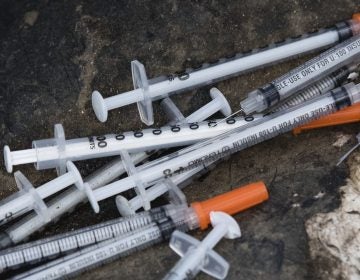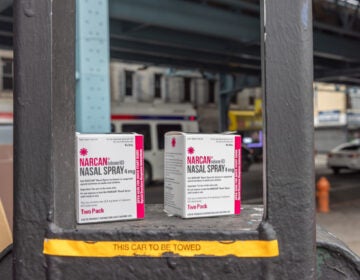Overdose deaths spike in beach towns of Sussex County
More than half of suspected overdose deaths are occurring in the southernmost part of the county, and health officials warn it might be due to fentanyl-laced heroin.

Delaware health officials say a record number of overdose deaths appear to be linked to fentanyl. (File photo)
A spike in fatal overdoses in Sussex County may be due to fentanyl-laced heroin, according to Delaware’s Department of Health and Social Services.
More than half of suspected overdose deaths are occurring in the southernmost part of the county.
“These substances clearly are dangerous, especially those being used in Sussex County,” said Dr. Kara Odom Walker, department secretary. “If you are in active use, we urge you to seek treatment immediately. If you continue to use substances, have the overdose-reversing medication naloxone with you because the risk for death is increased. Reducing harm and saving lives are our first priorities.”
As of Thursday, the Division of Forensic Science reported that seven of this month’s 13 deaths from suspected overdoses in the state took place in Sussex County. Last July, four of the 21 suspected overdose deaths took place in county.
Sussex County has accounted for about 22 percent of the 143 suspected overdose deaths in Delaware this year.
Last year, there were 345 overdose deaths, a roughly 12 percent increase from the previous year. More than 18 percent of those took place in Sussex County.
Cathy McKay, CEO of Connections Community Support Programs, said her organization’s rehab clinics in the county have seen a bump in the number of clients from 650 in February to about 1,000 today.
McKay and other health officials say individuals struggling with addiction could use heroin laced with fentanyl without knowing what they’re consuming, because it also is a white powdery substance.
The synthetic painkiller is up to 50 times more potent than heroin. Fentanyl affects the central nervous system and the brain. Because it’s such a powerful opioid, users often have trouble breathing or can stop breathing as the drug sedates them.
Naloxone, the drug paramedics and others carry to reverse an overdose, can be administered to individuals who have consumed fentanyl, heroin or opioid pain killers. However, because fentanyl is more potent than other opioids, multiple doses of naloxone may be needed.
In 2017, about 61 percent of the overdose deaths in Delaware involved fentanyl, according to the health department.
“People think they’re buying heroin, and they know how much heroin they can use and usually be OK, but what they buy is not actually heroin, and they don’t know it,” McKay said.
“A lot of people coming in to the opioid withdrawal management center were withdrawing from fentanyl, but really didn’t know it.
“The other thing we’ve been seeing is there’s also fentanyl in the cocaine supply, so there are some people thinking they’re using cocaine, but they’re using cocaine that has fentanyl in it.”
Walker said her department is working to spread the word to active users about the dangers of fentanyl.
What’s next?
McKay said her organization is considering ways to expand to the beach areas of Delaware, because individuals in this area are underserved. Two of this month’s overdose deaths took place in Ocean View.
McKay said it’s difficult to run a clinic in beach towns, where the population is transient with people traveling in and out for summer holidays. However, she said, the need for addiction services is significant.
“Knowing we’ve had people come from over there and not stay because of the difficulties with transportation and barrier of the traffic,” McKay said.
She said there may also be an addiction issue in Sussex County because medication such as methadone has more of a stigma in southern Delaware.
McKay said she does not believe, however, the opioid crisis will continue to grow over the years — for better or worse.
“We had a big problem with opioids in late 1970s, and then, all of a sudden, it shifted over to crack cocaine. Then we had a big problem with crack cocaine, and now we’ve gotten back to having a big problem with opioids,” she said.
“I think some other drug will supplant it. But I think we’re going to have to deal with this cohort of people who have become addicted to opioids until they die. It’s a lifelong disease, it has a relapsing remitting course, and people who have it will always have to have access to treatment for it. Some other drug will become behind it, and it won’t necessarily be better than this.”
But until some other drug supplants heroin, Walker said, she believes this year’s opioid overdose deaths in Delaware will surpass last year’s numbers.
“It is alarming — despite all our efforts, it continues to increase,” she said. “We’re worried it’s going to be a worse year than the prior, despite redoubling efforts and putting more money into resources in treatment and safe-living arrangements. Any spike like this is a life lost, a loved one, co-worker, neighbor lost, and we have to do more.”
WHYY is your source for fact-based, in-depth journalism and information. As a nonprofit organization, we rely on financial support from readers like you. Please give today.




